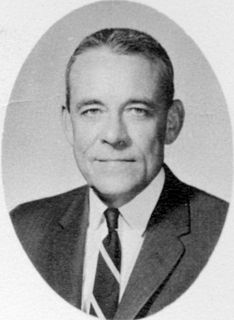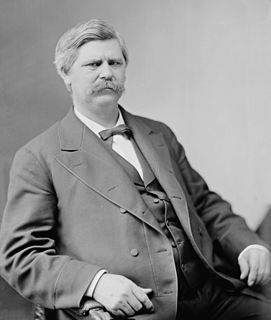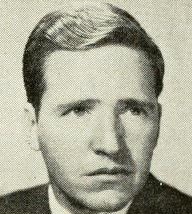| |||||||||||||||||
| |||||||||||||||||
| |||||||||||||||||
| Elections in North Carolina |
|---|
 |
The 1960 North Carolina lieutenant gubernatorial election was held on November 8, 1960. Democratic nominee Harvey Cloyd Philpott defeated Republican nominee S. Clyde Eggers with 58.98% of the vote.
| |||||||||||||||||
| |||||||||||||||||
| |||||||||||||||||
| Elections in North Carolina |
|---|
 |
The 1960 North Carolina lieutenant gubernatorial election was held on November 8, 1960. Democratic nominee Harvey Cloyd Philpott defeated Republican nominee S. Clyde Eggers with 58.98% of the vote.
Primary elections were held on May 28, 1960. [1]
| Party | Candidate | Votes | % | |
|---|---|---|---|---|
| Democratic | Harvey Cloyd Philpott | 238,353 | 40.04 | |
| Democratic | C.V. Henkel | 181,850 | 30.55 | |
| Democratic | David M. McConnell | 175,150 | 29.42 | |
| Total votes | 595,353 | 100.00 | ||
| Party | Candidate | Votes | % | |
|---|---|---|---|---|
| Republican | David E. Bailey | 10,704 | 51.59 | |
| Republican | S. Clyde Eggers | 6,401 | 30.85 | |
| Republican | Otha B. Batten | 3,645 | 17.57 | |
| Total votes | 233,074 | 100.00 | ||
| Party | Candidate | Votes | % | ±% | |
|---|---|---|---|---|---|
| Democratic | Harvey Cloyd Philpott | 765,519 | 58.98% | ||
| Republican | S. Clyde Eggers | 532,445 | 41.02% | ||
| Majority | 233,074 | ||||
| Turnout | |||||
| Democratic hold | Swing | ||||
Southern Democrats, historically also known colloquially as Dixiecrats, are members of the U.S. Democratic Party who reside in the Southern United States.

The 1978 United States Senate elections in the middle of Democratic President Jimmy Carter's term. Thirteen seats changed hands between parties, resulting in a net gain of three seats for the Republicans. Democrats nevertheless retained a 58–41 majority.

The 1954 United States Senate elections was a midterm election in the first term of Dwight D. Eisenhower's presidency. Eisenhower's Republican party lost a net of two seats to the Democratic opposition. This small change was just enough to give Democrats control of the chamber with the support of an Independent who caucused with them.

The North Carolina Democratic Party (NCDP) is the North Carolina affiliate of the Democratic Party. It is headquartered in the historic Goodwin House, located in Raleigh.

Harvey Cloyd Philpott was an American businessman and politician who served as the 24th Lieutenant Governor of North Carolina in 1961. Philpott grew up in Lexington, North Carolina. Following the completion of his education, he rose to become president and chairman of the board of the United Furniture Corporation. He held several local political offices before being elected to a seat in the North Carolina House of Representatives in 1953 as a Democrat. During his tenure he served on the Pearsall Committee and played a key role in the passage of a state minimum wage law. He left the House in 1959 and in 1960 was elected Lieutenant Governor of North Carolina. In his short time in the latter office, Philpott was a key ally in the legislature for Governor Terry Sanford. Sanford originally wished that Philpott would succeed him as governor, but this was cut short by Philpott's sudden death eight months into his term.

The 1976 North Carolina gubernatorial election was held on November 2, 1976. Democratic nominee Jim Hunt defeated Republican nominee David T. Flaherty with 64.99% of the vote.

The 1960 North Carolina gubernatorial election was held on November 8, 1960. Democratic nominee Terry Sanford defeated Republican nominee Robert L. Gavin with 54.45% of the vote.

The 1936 North Carolina gubernatorial election was held on November 3, 1936. Democratic nominee Clyde R. Hoey defeated Republican nominee Gilliam Grissom with 66.69% of the vote.

The 1932 North Carolina gubernatorial election was held on November 8, 1932. Democratic nominee John C. B. Ehringhaus defeated Republican nominee Clifford C. Frazier with 70.07% of the vote. At the time, Ehringhaus was an attorney and former state legislator; Frazier was an attorney, based in Greensboro.

The 1896 North Carolina gubernatorial election was held on November 3, 1896. Republican nominee Daniel Lindsay Russell defeated Democratic nominee Cyrus B. Watson with 46.52% of the vote. This was the only election in North Carolina between 1872 and 1972 in which the Republican nominee won the governor's office.

The 1892 North Carolina gubernatorial election was held on November 8, 1892. Democratic nominee Elias Carr defeated Republican nominee David M. Furches with 48.3% of the vote. Harry Skinner unsuccessfully ran for the Populist nomination.

The 1888 North Carolina gubernatorial election was held on November 6, 1888. Democratic nominee Daniel Gould Fowle defeated Republican nominee Oliver H. Dockery with 51.97% of the vote.

The 1884 North Carolina gubernatorial election was held on November 4, 1884. Democratic nominee Alfred Moore Scales defeated Republican nominee Tyre York with 53.80% of the vote.

The 1876 North Carolina gubernatorial election was held on November 7, 1876. Democratic nominee Zebulon Baird Vance defeated Republican nominee Thomas Settle with 52.83% of the vote.

The 1992 North Carolina lieutenant gubernatorial election was held on November 3, 1992. Democratic nominee Dennis A. Wicker defeated Republican nominee Art Pope with 53.50% of the vote.

The 1988 North Carolina lieutenant gubernatorial election was held on November 8, 1988. Republican nominee Jim Gardner defeated Democratic nominee Tony Rand with 50.64% of the vote.
The 1984 North Carolina lieutenant gubernatorial election was held on November 6, 1984. Democratic nominee Robert B. Jordan defeated Republican nominee John H. Carrington with 53.70% of the vote.

The 1980 North Carolina lieutenant gubernatorial election was held on November 4, 1980. Democratic incumbent James C. Green defeated Republican nominee Bill Cobey with 53.20% of the vote.

The 1976 North Carolina lieutenant gubernatorial election was held on November 2, 1976. Democratic nominee James C. Green defeated Republican nominee William S. Hiatt with 66.04% of the vote.

The 1968 North Carolina lieutenant gubernatorial election was held on November 5, 1968. Democratic nominee Hoyt Patrick Taylor Jr. defeated Republican nominee Don H. Garren with 55.36% of the vote.